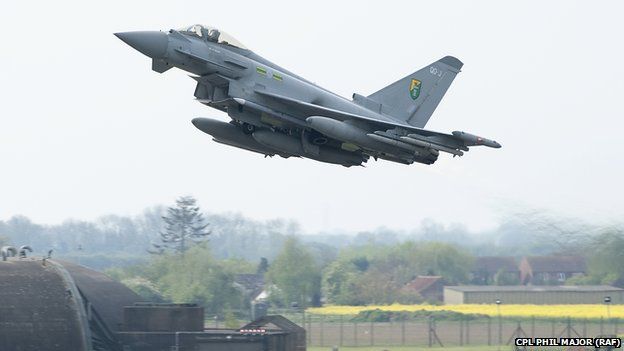Why Nato-Russia relations soured before Ukraine
-
Published

The Ukraine conflict has pushed Nato-Russia relations to a new low, and there are fears that the old Cold War suspicions and hostility are back.
Relations have been deteriorating for years, despite some fruitful co-operation in Afghanistan, anti-piracy efforts at sea and shared peacekeeping operations.
Nato accuses Russia of sending regular military units and heavy armour into eastern Ukraine to help separatist forces. Some are calling it an invasion by stealth. Russia denies the allegations and accuses Ukraine's pro-Western government of aggression.
What other tensions with Russia led to the current chill?
Eastward enlargement
The end of communism brought a clamour from East and Central European politicians for Nato membership, as a bulwark against any future aggression by Russia. Nato membership was also seen as a mark of commitment to Western values and standards.
In 1999 - nearly 10 years after the Berlin Wall fell - Nato admitted three former Warsaw Pact countries: the Czech Republic, Hungary and Poland.
More former Soviet bloc countries joined Nato in 2004: the Baltic states (Estonia, Latvia, Lithuania), Bulgaria, Romania, Slovakia and Slovenia.
Russia was particularly riled by the expansion of Nato to the Baltic states, which were formerly in the USSR and viewed from Moscow as part of the "near abroad". That phrase, commonly used by Russian politicians, implies that ex-Soviet states should not act against Russia's strategic interests.
At the Nato summit in Wales this week, Finland - not a Nato member - is due to sign a Host Nation agreement with the 28-nation alliance. It means Finland will give Nato forces logistical support - though not a base - on its soil. No Nato country has a border with Russia as long as Finland's.
Sweden has also decided to sign the agreement but a date has not yet been set. The two Nordic countries already co-operate closely with Nato and may become members in the future.
In early 2008 Nato also held out the prospect of future Nato membership to Georgia. The Kremlin saw that as a direct provocation, just as it saw closer Nato ties with Ukraine.
Last month Ukraine's Prime Minister Arseniy Yatsenyuk said he would ask parliament to clear the way for a Nato membership bid. Such a move had been blocked by former President Viktor Yanukovych, a friend of Moscow, who was ousted in February after mass protests gripped Kiev.
Missile defence
The US-led development of an anti-ballistic missile defence system alarms Russia.
Nato argues that the missile interceptor shield will be purely defensive, posing no threat to Russia, and that it is intended to thwart any future missile attack by a rogue state. Iran and North Korea are seen as potential threats to Western security in that connection.
Russia wanted an equal partnership with Nato in developing such a system. But that option was not pursued, and Nato is beginning the deployment of interceptor missiles and radars in Romania, the Czech Republic and Poland.
In December 2013 Russia deployed mobile tactical Iskander missiles in its Kaliningrad enclave in response to the Nato project.
Georgia conflict
Russia's brief war against Georgia in August 2008 soured relations with Nato.
During the war Russia backed separatists in two breakaway regions of Georgia - South Ossetia and Abkhazia. Russia smashed the Georgian military, which had tried to reoccupy South Ossetia.
Russia poured troops into Georgia - at one point they pushed close to the capital Tbilisi - and the West called Moscow's actions disproportionate. Later Russia recognised the two breakaway regions as independent, but in reality it is a frozen conflict, as the regions are not recognised internationally.
Nato suspended the Nato-Russia Council created in 2002, then Russia suspended military co-operation with Nato. Relations thawed the following year.
Kosovo conflict
Russia - a historic ally of Serbia - has been staunchly supporting Belgrade on the Kosovo issue.
Serbia has never accepted Kosovo's secession - achieved with Nato help in 1999 - though it has agreed not to block Kosovo's path to EU membership. Many other countries also reject Kosovo's 2008 independence declaration.
Russia froze military co-operation with Nato shortly after the alliance launched large-scale bombing raids on Serbia in 1999.
Kosovo, mainly populated by ethnic Albanians, broke away in an armed revolt by separatists and there was international outrage at the brutality of Serb security forces. Nato intervened when civilians fled the Serb forces en masse, pouring into neighbouring countries.
During that intervention there was a tense stand-off with Russian troops in the capital Pristina, but it was soon defused.
Treaty dispute
In 2007 Russia suspended its observance of the Conventional Forces in Europe (CFE) treaty.
The treaty, limiting the amount of key military equipment in designated regions, was signed by Western and former Warsaw Pact states in 1990. It was revised in 1999 to take account of former Soviet satellites joining Nato.
However the alliance - unlike Russia - refused to approve the updates, insisting that Moscow must first pull its remaining troops out of Georgia and Moldova.
Nato has announced plans to deploy a rapid response force of several thousand troops in Eastern Europe, closer to Russia's borders.
The force could be mobilised within 48 hours, made up of member states' troops on a rotating basis.
Such a move would further undermine the CFE treaty, though Nato insists the new force would not have permanent new bases.